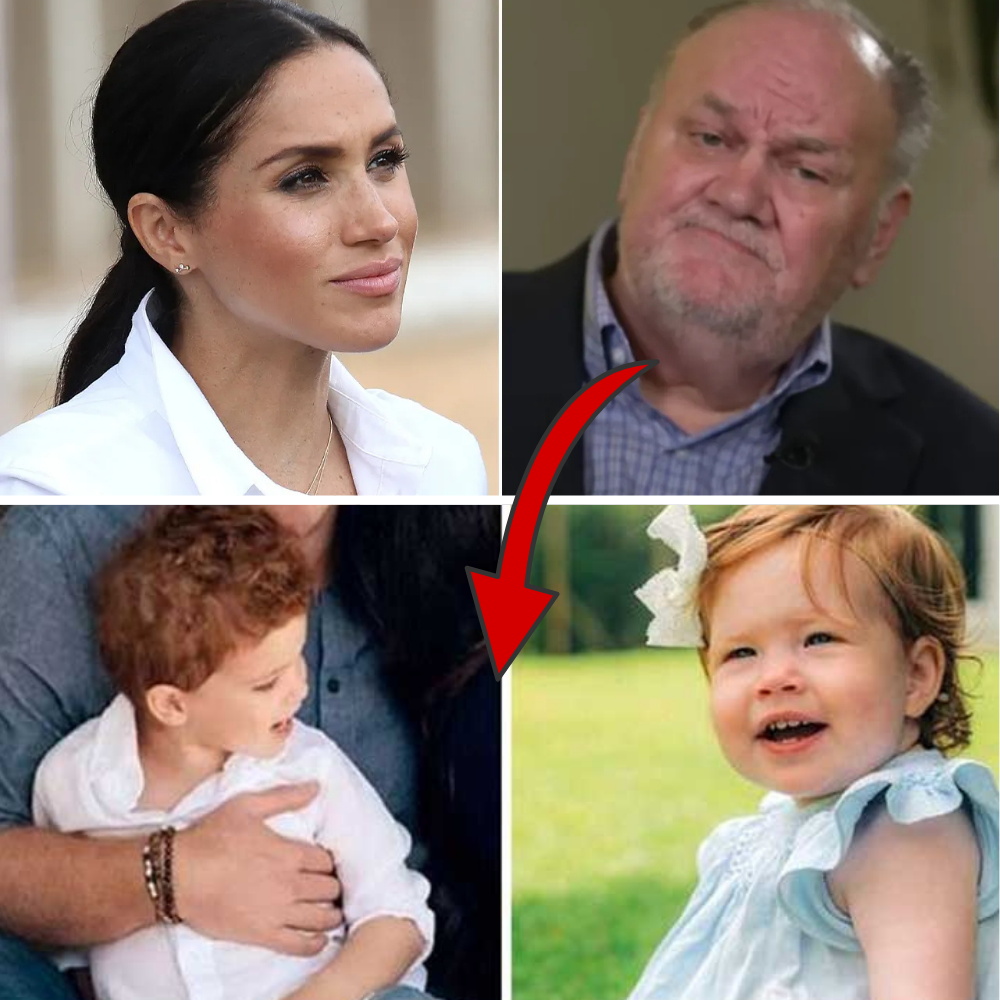
The saga of Meghan Markle’s strained relationship with her father, Thomas Markle, has captivated public attention for years, evolving into a deeply personal and public drama that shows no signs of resolution. At the heart of this feud lies a poignant issue: Thomas’s desperate wish to meet his grandchildren, Prince Archie and Princess Lilibet, and Meghan’s apparent refusal to allow it, fueled by what appears to be an enduring grudge. Despite the innocence of her children, Meghan’s sharp words and unwavering stance have kept this family divide firmly in place, raising questions about forgiveness, family ties, and the pressures of life in the spotlight.
The roots of this conflict trace back to 2018, just before Meghan’s wedding to Prince Harry. Thomas, a retired Hollywood lighting director, became embroiled in controversy when he staged paparazzi photos for profit, a decision that embarrassed the royal family and strained his relationship with his daughter. The situation worsened when Thomas suffered a heart attack days before the wedding, preventing him from attending and walking Meghan down the aisle. Instead, then-Prince Charles stepped in, a moment Thomas later expressed mixed feelings about, appreciating the gesture but lamenting his absence. Meghan, hurt by her father’s actions and his initial denial of the photo scandal, began to distance herself, marking the beginning of their estrangement.
Since then, the rift has only deepened. Thomas has repeatedly spoken to the media, expressing his heartbreak over being cut off from Meghan and her children. He has never met Archie, born in 2019, or Lilibet, born in 2021, and has voiced his anguish over this exclusion. In interviews, he has described the pain of learning about his grandchildren’s births through news reports rather than personal communication. His health challenges, including a stroke in 2022 that temporarily robbed him of speech, have added urgency to his pleas. Despite these hardships, Meghan and Harry have not reached out, leaving Thomas feeling isolated and betrayed.
Meghan’s perspective, however, sheds light on why reconciliation remains elusive. In a candid interview with Oprah Winfrey, she revealed the emotional toll of her father’s actions, particularly his decision to engage with the press. She described efforts to shield him from media scrutiny, only to feel betrayed when he collaborated with tabloids. The leak of a private letter she wrote to him further eroded trust, prompting Meghan to pursue legal action against the outlet responsible. For her, these incidents were not just personal slights but violations of trust that impacted her family’s privacy and safety, especially given the intense media attention surrounding her life as a royal.
The children, Archie and Lilibet, are caught in the crossfire of this feud, despite their innocence. Thomas has argued that denying him access to his grandchildren is unfair, not only to him but also to the children, who are growing up without a connection to their maternal grandfather. He has also suggested that Meghan’s decision to keep the children away from him mirrors her approach to the royal family, pointing to a broader pattern of distancing from relatives. This perspective has fueled public debate, with some sympathizing with Thomas’s longing for family connection and others supporting Meghan’s right to protect her children from a relationship she deems toxic.
The dynamics of this feud are complicated by the public nature of both parties’ actions. Thomas’s frequent media appearances, where he has criticized Meghan and Harry, have likely deepened the divide. His comments, often laced with frustration and hurt, have included claims that Meghan is not the daughter he once knew and that she exerts significant influence over Harry. These public statements, while cathartic for Thomas, may have further alienated Meghan, who has emphasized the importance of privacy in her family’s life. Her decision to step back from royal duties in 2020 and relocate to California was partly motivated by a desire to shield her children from the relentless media scrutiny that she herself has faced.
Adding to the complexity is the broader context of Meghan and Harry’s life in Montecito, California, where they are raising their children away from the royal spotlight. The couple has focused on building a new life, with projects like their Netflix series and Harry’s memoir, Spare, reflecting their efforts to carve out an independent identity. Yet, this independence has come at the cost of strained family ties, not only with Thomas but also with the royal family. Thomas has drawn parallels between his situation and that of King Charles, noting that both grandfathers have limited access to Archie and Lilibet. This comparison underscores the broader theme of familial disconnection that permeates this story.
For Meghan, the decision to keep her distance from her father may stem from a need to protect her mental health and her children’s well-being. Her public statements suggest a deep sense of betrayal, particularly over Thomas’s media interactions. However, her refusal to engage with him has drawn criticism from some who argue that she should consider reconciliation, especially given Thomas’s age and health struggles. The question of whether Meghan’s resentment is justified or overly harsh remains a point of contention, with no easy answers.
As this family drama unfolds, the public remains captivated by the emotional stakes involved. Thomas’s longing to meet his grandchildren contrasts sharply with Meghan’s apparent unwillingness to forgive, creating a narrative of heartbreak and unresolved conflict. Whether this rift can ever be healed is uncertain, but for now, the divide between father and daughter—and between a grandfather and his grandchildren—remains a poignant reminder of the challenges of navigating family ties under the glare of public scrutiny.